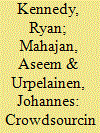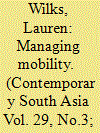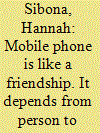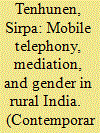|
|
|
Sort Order |
|
|
|
Items / Page
|
|
|
|
|
|
|
| Srl | Item |
| 1 |
ID:
175017


|
|
|
|
|
| Summary/Abstract |
Measuring energy access in developing countries involves much more than simply recording whether or not households are connected to the grid. Both international organizations and scholars now recognize the importance of reliable electricity supply for achieving positive development outcomes. Yet, measuring reliability is much more difficult than measuring the existence of connections. We propose an economical croudsourcing method for measuring reliability, and compare this method to energy monitor data for 122 households over 12 months. The results suggest that, while far from perfect, crowdsourcing provides a reasonably accurate method for monitoring the reliability of access over time, especially when modeled as a non-linear relationship. We apply these findings to model energy reliability in a broader group of villages across Uttar Pradesh, India, demonstrating the existence of disparities between urban and rural reliability and seasonal fluctuations in reliability. The system laid out in this study can be utilized by government and non-government organizations to quickly and cheaply monitor energy reliability.
|
|
|
|
|
|
|
|
|
|
|
|
|
|
|
|
| 2 |
ID:
180056


|
|
|
|
|
| Summary/Abstract |
Drawing on ethnographic fieldwork in Kolkata and rural West Bengal and engaging with literature on mobile phones in the global South, and on gender and sexuality in India, this article seeks to understand the incongruence between widespread mobile phone use in India and commuting domestic workers’ own accounts of their mobile phone use. It illustrates the important role that mobile phones play in enabling commuting workers (who are mostly women) to find work and manage relationships, but also how commuting workers play down their mobile phone use, guarding against suspicion from husbands, sons, and others. Such suspicion reflects the stigma around women’s mobility/sexuality, connected to ideas about women’s ‘honour’ and the perceived risks associated with women’s work and journeys. When workers’ mobile phone use is, then, perceived to be ‘inappropriate’, or if workers transgress norms and expectations relating to ideas about women’s ‘honour’ in other ways, they can face (further) surveillance and abuse, their access to phones thereafter often being controlled by men. Contributing to gendered analyses of mobile phones in the global South, the article shows how phones can at once create new possibilities and freedoms for commuting domestic workers while at the same time reinforcing gendered power relationships.
|
|
|
|
|
|
|
|
|
|
|
|
|
|
|
|
| 3 |
ID:
180057


|
|
|
|
|
| Summary/Abstract |
This article presents ethnographic accounts of the mobile phone mediated experiences of connection and intimacy among young low-income women in Dhaka, Bangladesh. It argues that mobile phones are a ‘pathway to empowerment’ insofar as the ever-evolving social practices of ‘wrong-number friendships’, long-distance courtship, and the management and manipulation of new contacts on mobile phones broaden the range of social interactions, enable expressions of aspirational mobility, and contribute to the evolution of a sense of self. It also explores how the affective power of mobile phone communication in intimate relationships alters perceptions of distance and creates forms of ‘immobile mobility’. Thus, this article builds on research that argues that the material affordances of a mobile phone challenge social and cultural gender norms and power dynamics. Moreover, by drawing out how mobility, gender and class intersect with the social and emotional experiences of low-income women in Bangladesh, it goes beyond existing literature and offers a more nuanced perspective on the notion that access to technology among marginalised and disempowered groups leads to poverty alleviation and greater equality.
|
|
|
|
|
|
|
|
|
|
|
|
|
|
|
|
| 4 |
ID:
117986


|
|
|
|
|
| Publication |
2013.
|
| Summary/Abstract |
Mobile telephones are revolutionizing politics and driving political change throughout the developing world. Nothing is so powerful, so transformative. Mobile telephone technology has already changed how people in the developing world cope with their political, economic, and social circumstances. Now, through its ability interactively to transmit verbal and visual (photos or video) information by voice and/or text messaging, mobile telephone technology is poised dramatically to improve human outcomes and life choices for many millions across the globe's weak and failed states. No other recently-introduced technology has been so widely embraced or has so much potential to alter rural and urban outcomes for the better in Africa, Asia, Latin America, and elsewhere.
|
|
|
|
|
|
|
|
|
|
|
|
|
|
|
|
| 5 |
ID:
090713


|
|
|
|
|
| Publication |
2009.
|
| Summary/Abstract |
Research concerning mobile phones and financial services in developing countries has undergone rapid growth in recent years. This paper seeks to improve understanding of the current state of knowledge by reviewing the content of 43 research articles. A framework is developed that differentiates research activity according to a lifecycle model that incorporates financial needs, design, adoption and impact. The review finds that research to date has resulted in a high level of practitioner involvement, providing valuable links from the mobile phone industry to the research community but, as a consequence, research has become too narrowly defined. Thus, issues of assessing financial need and the measurement of impact have been comparatively neglected, while application design and adoption studies have received greater attention. This paper suggests a future direction for research and practice within the mainstream of micro-financial services and finance for the poor, correcting this imbalance, and contributing towards the mobiles-in-development-research agenda.
|
|
|
|
|
|
|
|
|
|
|
|
|
|
|
|
| 6 |
ID:
161586


|
|
|
|
|
| Summary/Abstract |
This paper examines the potential benefits and pitfalls of mobile phones for accessing social services, particularly in response to gender‐based violence, in Solomon Islands and Papua New Guinea. Drawing on 13 months of ethnographic field research, I show how mobile phones increase rather than decrease perceived distances between social service providers and those they intend to serve. Mobile phones exaggerate the visibility of the shortcomings of the Solomon Islands and Papua New Guinea states and solidify an already entrenched distrust in the state and state services. This distrust is accentuated in experiences with mobile phone‐based mediations of gender‐based violence. Despite the positive influences of mobile phones, they are also recognised as conduits of violence. As such, mobile phones are not only morally ambivalent technologies but also, at times, actively disliked and their use discouraged. This challenges the optimism that surrounds many information and communication technologies for development (ICT4D) projects. When assessing the potentials, successes, and failures of ICT4D programmes, there is a need to pay more attention to the consequences of ‘negative’ or ‘unreliable’ usages of mobile phones as relational technologies.
|
|
|
|
|
|
|
|
|
|
|
|
|
|
|
|
| 7 |
ID:
130730


|
|
|
|
|
| Publication |
2014.
|
| Summary/Abstract |
This article aims to develop the understanding of new media and social change by examining how mobile phones mediate kinship and gender in rural India. I provide a nuanced picture of the contested nature of kinship and gender in the village based on long-term fieldwork in order to explore how mobile phones mediate relationships and ongoing processes of social change. The article illustrates how the physical qualities of phones help strengthen the multiplicity of discourses by mediating relationships and contributing to the multiplicity of speech contexts. Mobile phone use has been encouraged and motivated by kinship relationships and the use of mobile phones has, in turn, transformed these relationships by helping to create new contexts for speech and action. However, instead of the drastic improvements or changes, for instance in economic power relationships, the positive impacts of women's phone use appear subtle and ambiguous: most calls are about the slight redefinition of the home boundaries.
|
|
|
|
|
|
|
|
|
|
|
|
|
|
|
|
| 8 |
ID:
154504


|
|
|
|
|
| Summary/Abstract |
The aim of this article is to map smartphone usage among young Israeli adults. Data were gathered using a combined methodological approach, comprising a representative survey of 550 young Israeli adults (21–31 years old), followed by interviews with 60 undergraduate students. Five functions of gratification clusters were analysed. The highest gratification function was the integrative, followed by the cognitive, diversion, emotional, and environmental functions. Our findings indicate that cognition- and interaction-related applications, not stimulation- or escapism-related applications, are the primary characteristics of smartphone usage.
|
|
|
|
|
|
|
|
|
|
|
|
|
|
|
|
| 9 |
ID:
160380


|
|
|
|
|
| Summary/Abstract |
Over the last decade, the mobile phone has become an integral part of a subterranean ‘youth culture’ of romance in urban Central Morocco. By expanding the opportunities of male–female interaction, the mobile phone enables young women to explore the possibilities of emotional and physical intimacy beyond conventional rules of courtship. The desire for premarital romance, though, collides and interweaves with conventional gendered practices and moralities, as well as with the new religious sensibilities that have emerged with the Islamic revival. Tracing the ways Zahra and Yasmin, two unmarried women in their early 20s, mediate dynamics of flirting, seduction and jealousy via the mobile phone, the author shows how they affirm their respectability through and not in spite of their intimate mediated practices. Far from being only a powerful ‘mediator’ between intimate desires, social expectations and public morality, the mobile phone reveals itself as integral to the ways Zahra and Yasmin reflect on, and act in, their intimate and moral worlds. The author hopes to contribute to ‘gendering’ anthropological debates on ‘everyday Islam’ by showing the nuanced ways in which young women in Central Morocco use the mobile phone to shape their intimate lives, navigating competing femininities and gendered moralities.
|
|
|
|
|
|
|
|
|
|
|
|
|
|
|
|
| 10 |
ID:
119479


|
|
|
|
|
| Publication |
2013.
|
| Summary/Abstract |
It has been 15 years since the last wave of democratization. But as a region, North Africa and the Middle East were noticeably devoid of popular democracy movements-until the early months of 2011. Democratization movements had existed long before technologies like mobile phones and the Internet came to these countries. But with these technologies, people sharing an interest in democracy built extensive networks and activated collective action movements for political change. What might have made regimes more susceptible than others to these uprisings, and what might explain the relative successes of some movements over others? What role does information technology have in the modern recipe for democratization? Weighing multiple political, economic, demographic, and cultural conditions, we find that information infrastructure-especially mobile phone use-consistently appears as one of the key ingredients in parsimonious models for the conjoined combinations of causes behind regime fragility and social movement success. To understand the successes and failures of contemporary political protests, we must also assess how civil society leaders and authoritarian security forces treat communication technologies as democratically consequential.
|
|
|
|
|
|
|
|
|
|
|
|
|
|
|
|
|
|
|
|
|